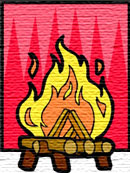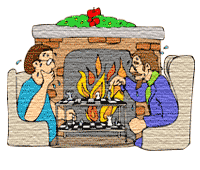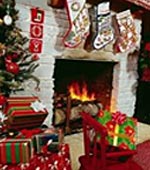Fire Safety Measures
 Fires are one of the leading causes of home injury and death.
Approximately one-half of home fire deaths occur in homes without smoke alarms and most residential fires occur during the winter months! That is
definitely a sad picture that we can see. So unless we all walk that extra mile and put in efforts to spread
awareness, it will be too late for us to do anything about it.
Fires are one of the leading causes of home injury and death.
Approximately one-half of home fire deaths occur in homes without smoke alarms and most residential fires occur during the winter months! That is
definitely a sad picture that we can see. So unless we all walk that extra mile and put in efforts to spread
awareness, it will be too late for us to do anything about it.
Note: parents' help is advisable in following the
instructions.
A couple of major reasons for fires to destroy our homes :
- Alcohol use.
- Smoke or toxic gases and not from burns.
Measures to prevent Fire Hazards :

- Help your parents and your younger brothers or sisters to quickly escape a fire.
Despite a fire alarm's piercing sound, children, teenagers, even some
adults can sleep through it. So it's absolutely important to teach everyone at your home how to escape a late-night fire.
- Also make sure the smoke alarms or detectors are in accessible areas in your
home, such as the kitchen, near bedrooms, and near fireplaces or stoves.
- Install at least one smoke alarm on every floor of your home, including the basement.
- Replace batteries in smoke detectors at regular intervals. Get the alarms checked atleast twice a year.
You can make it every spring and fall.
- For people with hearing disabilities, special smoke alarms with strobes and or vibration are available. You can buy these online and through local fire equipment distributors.
- Install new smoke alarms when they are 10 years old or older (sooner if one is damaged or not working).
- Keep a fire extinguisher near the kitchen and have it checked yearly. Put out food or grease fires in a pan with a lid or another pot.
- Learn the safety rules for matches, fires, electrical outlets, electrical cords, stoves, and chemicals. Keep matches and flames, such as candles or lanterns, out of the reach of children.
- Ask your parents to buy sleepwear made of flame-retardant fabric. Dress
in flame- and fire-retardant clothing. Older adults need to be careful about wearing clothing with loose material that could catch on fire.
- Organize occasional Family Fire Drills with your parents at least twice a year.
Plan a fire escape route. Choose a meeting place outside the home where everyone will gather, and be sure
no one goes back inside a burning building.
- Know the emergency number for your fire department; Remember to get out first if there is a fire, then call for help once safely outside.
- Teach children who are old enough to understand to stop, drop, and roll if their clothing catches on fire so they can help put out the flames and avoid serious
burns and to always keep stairways and exits clear of furniture, toys, and other obstructions that could slow your
escape process.
Equipments that has the chances of Fire Hazards
Cooking Equipment :
- Keep an eye on anything you're cooking if the setting is higher than "warm."
- Keep potholders, plastic utensils, towels, or other non-cooking equipment away from the stove.
- Roll up or fasten long, loose sleeves while cooking.
- Store candy or cookies away from the stove so kids won't be tempted to climb on it to get to the treats.
Cigarettes, Lighters and Matches :
Keep the Cigarettes, Lighters and Matches away from fire and out of sight and reach of
children. Smoking materials are the leading cause of home fire deaths. The tools used to light them are also a fire hazard.
Make sure that cigarette butts are fully extinguished before emptying ashtrays. Never place a cigarette butt directly into a trashcan without
extinguishing it with water first.
Furnaces, Fireplaces, and Space Heaters :
 Furnaces should be inspected annually. Keep boxes, paper, and other flammables away from the furnace.
Furnaces should be inspected annually. Keep boxes, paper, and other flammables away from the furnace.
Fireplaces should be protected with screens or tempered glass doors. Keep kindling at least three feet away from the fireplace. Have the chimney inspected yearly and cleaned
regularly.
When purchasing an electric space heater, look for the safety mark. Keep at least three feet between the heater and anything that can burn. Turn the heater off before falling asleep or leaving the area you are heating.
Wood-Burning Stoves
- Make sure wood-burning stoves are properly installed and meet your town's building and fire codes.
- These stoves are not designed to burn trash or other items. Never use gasoline or other flammable liquids to start a stove fire. Burn coal only if recommended by the manufacturer.
- Remember that wood and coal stoves get very hot. If you have young children living in or visiting your home, supervise them carefully and consider installing a temporary stove guard to help prevent burns.
Follow stove instructions and cleaning and maintenance requirements.
Have chimneys inspected each year and cleaned, if necessary, by a professional chimney sweep to avoid dangerous creosote buildup.
Kerosene Heaters
- Learn local and state codes and regulations about the use of kerosene
heaters.
- Use kerosene only. Never use gasoline in your heater. Gasoline is highly
volatile, greatly increasing the risk of fire.
- Keep the room ventilated (a door open, or a window ajar) to prevent an
indoor air pollution problem.
Gas-Fired Space Heaters
- These heaters should not be used in small, enclosed areas -- especially bedrooms -- because there is potential for explosion or carbon monoxide poisoning.
- Follow the manufacturer's instructions for lighting the pilot. Otherwise, gas vapors can accumulate and ignite, burning your hand or face.
- Light one match, if needed for lighting the pilot, before you turn on the gas to prevent gas buildup. Keep flammable materials away from gas-fired appliances.
- Do not use a propane heater (LP) with a gas cylinder.
Other Hazards :
- Use proper fuses in electrical boxes, do not overload outlets, and use insulated and grounded electrical cords.
- Keep trash cleaned up in attics, basements, and garages.
- Be careful with gas equipment such as lawn mowers, snow blowers, and chain saws.
- Avoid fireworks. Think of safety first when dealing with fireworks.
Let's make it our responsibility to educate the ones who are ignorant
about the hazards caused by fire to avoid any casualties and destruction
of our homes and surrounding. Feel free to send in your suggestions and
feedback on this section. Parents are also welcome.
Back to School Projects Main

 Fires are one of the leading causes of home injury and death.
Approximately one-half of home fire deaths occur in homes without smoke alarms and most residential fires occur during the winter months! That is
definitely a sad picture that we can see. So unless we all walk that extra mile and put in efforts to spread
awareness, it will be too late for us to do anything about it.
Fires are one of the leading causes of home injury and death.
Approximately one-half of home fire deaths occur in homes without smoke alarms and most residential fires occur during the winter months! That is
definitely a sad picture that we can see. So unless we all walk that extra mile and put in efforts to spread
awareness, it will be too late for us to do anything about it.
 Furnaces should be inspected annually. Keep boxes, paper, and other flammables away from the furnace.
Furnaces should be inspected annually. Keep boxes, paper, and other flammables away from the furnace.